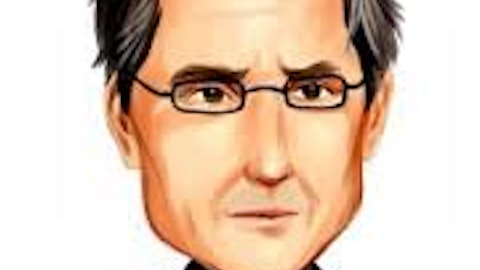“We’re not buying corporate bonds of any kind. Not at these yields.” Warren Buffett
“Bonds are terrible investments now.” Warren Buffett
“Bonds really should come with a warning label.” Warren Buffett

Picking up nickles in front of a steamroller
Today, the nominal yield on the iShares Barclays 7-10 Year Treasury Bond Fund (NYSEMKT:IEF) is about 1.7%.
The key word is nominal. Because the 1.7% yield doesn’t reflect the real change in investor wealth. After factoring in taxes and inflation, investors’ real returns are negative.
Another problem when interest rates are this low is that a small change in yield can have a massive impact on the price of a bond. If yields increase by 1%, the value of the fund will decline almost 10%. If interest rates rise 2%, which would still put yields well below historical norms, this fund would lose nearly 20% of its value.
Several catalysts could send rates higher. A slight uptick in inflation or improvement in the overall economy would encourage investors to rotate out of bonds and into alternatives.
In exchange for this risk: a measly 1.7% yield.
Corporate credit even riskier
The crowding out effect of central bank purchases of government securities is forcing investors to chase yield in increasingly risky securities. Given that these bonds are being priced against artificially priced treasuries, this has to end badly.
Consider Apple Inc. (NASDAQ:AAPL)‘s recent 30 year debt issue. What will the next three decades bring? Higher inflation? New technology? Who’s to say Apple will be relevant five years from now. There’s no reason anyone should reach for a 30-year bond from a good yet risky company.
The hunt for yield is causing a stampede into junk bonds. Global high yield bond issuance reached a record $148.6 billion during the first quarter, up 25% from the same period last year.
Of course, credit risk is nothing new. What’s different today is how little investors are being compensated to take on that risk. Junk bonds and 30-year Apple debt yield only 100 basis points over U.S. Treasuries.
We’re witnessing a “dash for trash,” in which investors are willing to buy any bond that pays a premium rate no matter how risky.
Better alternatives
So where is Buffett investing Berkshire Hathaway Inc. (NYSE:BRK.B)’s $85 billion portfolio? Equities.
Productive assets like stocks are, in Buffett’s own admission, reasonably priced. But in addition to higher potential returns, equities will better retain their real value if inflation makes an unwelcome return.
We can find specific examples in the company’s latest SEC 13-F filing earlier this month.
In of its biggest transactions this quarter, Berkshire disclosed a $376 million stake in Chicago Bridge & Iron Company N.V. (NYSE:CBI). Chicago Bridge & Iron Company N.V. (NYSE:CBI) is an energy infrastructure company that provides engineering, construction, and maintenance services. Boasting some of the world’s largest energy companies as clients, the company is positioned to benefit from the development of America’s shale oil and gas reserves.

